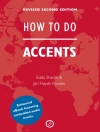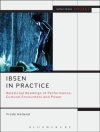Performing Southeast Asia: Performance, Politics and the Contemporary is an important reconsideration of the histories and practices of theatre and performance in a fluid and dynamic region that is also experiencing an overarching politics of complexity, precarity and populist authoritarian tendencies. In a substantial introductory essay and essays by leading scholars, activists and practitioners working inside the region, the book explores fundamental questions for the arts. The book asks how theatre contributes to and/or addresses the political condition in the contemporary moment, how does it represent the complexity of experiences in peoples’ daily lives and how does theatre engagein forms of political activism and enable a diversity of voices to flourish. The book shows how, in an age of increasingly violent politics, political institutions become sites for bad actors and propaganda. Forces of biopolitics, neo-liberalism and religious and ethnic nationalism intersect in unpredictable ways with decolonial practices – all of which the book argues are forces that define the contemporary moment. Indeed, by putting the focus on contemporary politics in the region alongside the diversity of practices in contemporary theatre, we see a substantial reformation of the idea of the contemporary moment, not as a cosmopolitan and elite artistic practice but as a multivalent agent of change in both aesthetic and political terms. With its focus on community activism and the creative possibilities of the performing arts the region, Performing Southeast Asia, is a timely intervention that brings us to a new understanding of how contemporary Southeast Asia has become a site of contest, struggle and reinvention of the relations between the arts and society.
Peter Eckersall
The Graduate Center
City University of New York
Performing Southeast Asia – with chapters concerned with how regional theatres seek contextually-grounded, yet post-national(istic) forms; how history and tradition shape but do not hold down contemporary theatre; and how, in the editors’ words, such artistic encounters could result in theatres ‘that do not merely attend to matters of cultural heritage, tradition or history, but instead engage overtly with theatre and performance in the contemporary’ – contributes to the possibility of understanding what options for an artistically transubstantiated now-ness may be: to the possibility, that is, of what might be called a ‘Present-Tense Theatre’.
C. J. W.-L. Wee
Professor of English
Nanyang Technological University
Performing Southeast Asia examines contemporary performance practices and their relationship with politics and governance in Southeast Asia in the twenty-first century. In a region haunted historically by strongman politics, authoritarianism and militarism, religious tension and ethnic strife, the chapters reveal how contemporary theatre and performances in the present reflect yet challenge dominant socio-political discourses. The authors analyse works of political commitment and conviction, created and performed by Southeast Asian artists, as modes and platforms of reaction and resistance to the shifting political climates that inform contemporary life in urban Southeast Asia. The discussions center on issues of state hegemonies and biopolitics, finance and sponsorship, social liberalism and conservatism, the relevance of history and tradition, and globalisation and cultural practice. These diverse yet related concerns converge on an examination of the efficacies of theatre and performance as means of political intervention and transformation that point to alternative embodiments of political consciousness through which artists propose critical options for rethinking the state, citizenship, identity and belonging in a time of seismic socio-political change. The editors also reframe an understanding of ‘the contemporary’ not simply as a temporal adjective but, in the context of present Southeast Asia, as a geopolitical condition that shapes artistic and performance practices.
Cuprins
1. Politics, Performance, the Contemporary and Southeast Asia; Marcus Cheng Chye Tan and Charlene Rajendran.- 2. ‘Yesterday’s Dreams, Tomorrow’s Promise’: Performing a Pan-ASEAN Archipelagic Identity at Age 50; William Peterson and Reagan Romero Maiquez.- 3. ‘Pornography Disguised as Art’: Bare/d Bodies, Biopolitics and Multicultural Tolerance in Singapore; Marcus Cheng Chye Tan.- 4. ABaling in a Time of BERSIH: Embodying Historical Transcripts as Enactments of Resistance; Charlene Rajendran.- 5. Staging the Banality of Social Evil: Faust and/in Philippine Contemporary Social Politics; Sir Anril Pineda Tiatco.- 6. A Transformative Theatre of Dialogue: The Makhampom Theatre Group’s Negotiation of Thailand’s Likay (Theatre) State; Richard Barber and Pongjit Saphakhun.- 7. Intervention, Openness and Ownership: Interview with Ong Keng Sen on Festival Dramaturgy; Charlene Rajendran.- 8. Wayang kontemporer: The Politics of Sponsorship and Innovation; Miguel Escobar Varela.- 9. Authenticity and Contemporary Musical Theatre in Thailand; Wankwan Polachan.- 10.Bangsokol: A Requiem for Cambodia—The Politics of Memory and an Aesthetics of Remembrance; Marcus Cheng Chye Tan.- 11. The Wheres and Whys of Southeast Asia: Art and Performance in the Locating of Southeast Asia Today; Farish A. Noor.
Despre autor
Marcus Cheng Chye Tan is Assistant Professor at the National Institute of Education, Nanyang Technological University, Singapore. He is author of Acoustic Interculturalism: Listening to Performance (Palgrave Macmillan, 2012) and is also Associate Editor of the Journal of Interdisciplinary Voice Studies, co-convenor of the Music Theatre Working Group, International Federation for Theatre Research and online content manager for Theatre Research International. Marcus researches primarily in intercultural theatre and sound and performance, and has published extensively in journals such as TDR, Theatre Research International, Performance Research and Contemporary Theatre Review.
Charlene Rajendran is a theatre educator, dramaturg and practitioner, who is currently Assistant Professor at the National Institute of Education, Nanyang Technological University, Singapore. She is co-editor of Interrogations, Excavations, Krishen Jit & Contemporary Malaysian Theatre (2018) and has published a range of articles, including in journals such as Asian Theatre Journal, TDR, RIDE and Theatre, Dance and Performance Training. She is Co-Director of the Asian Dramaturgs Network and Asia-Pacific Book Reviews Editor for Theatre Research International.












